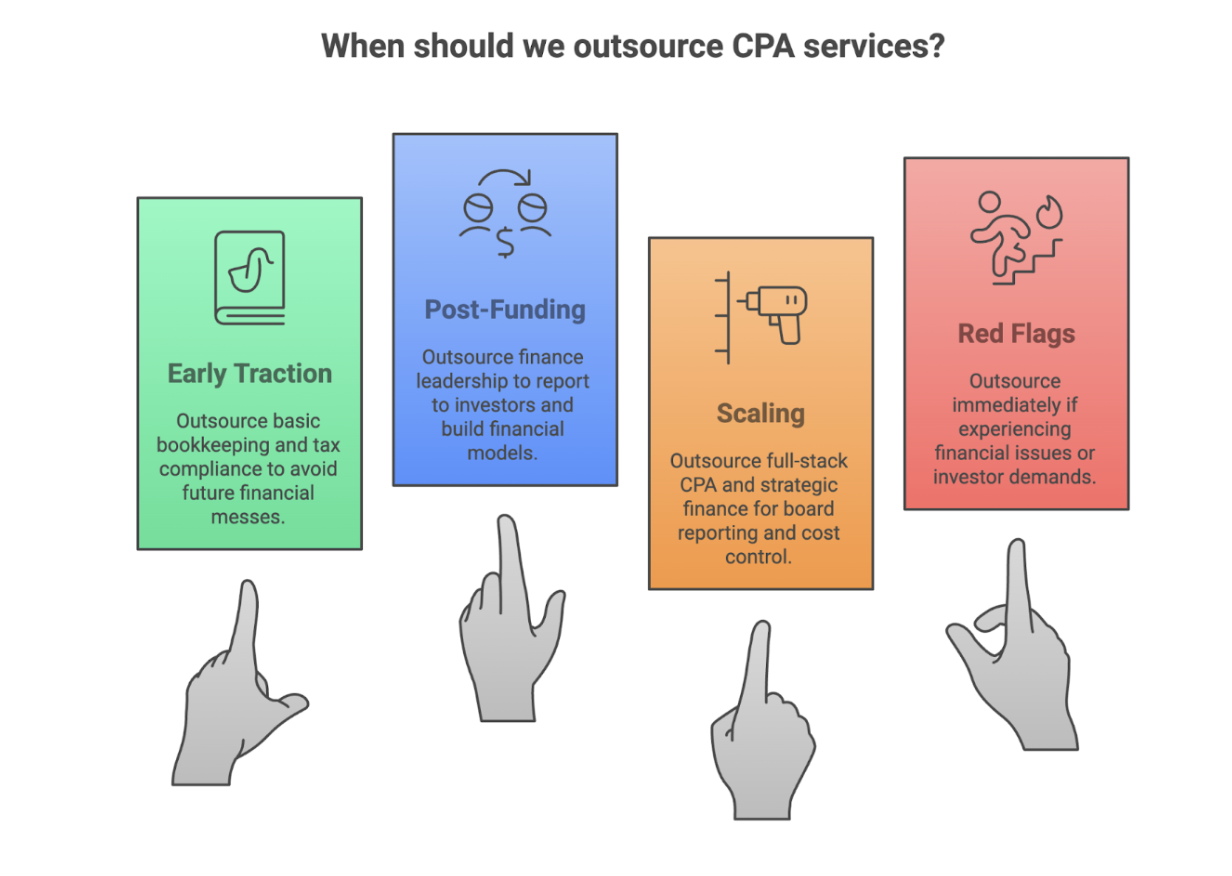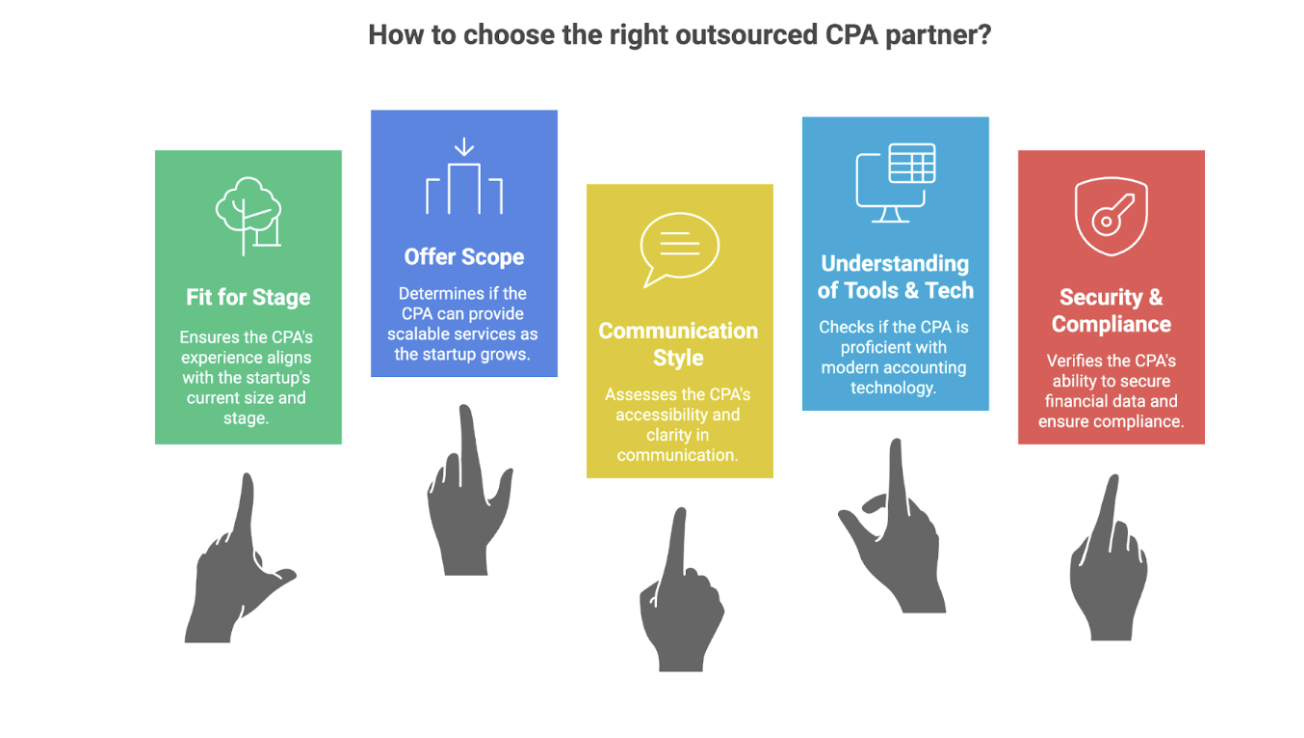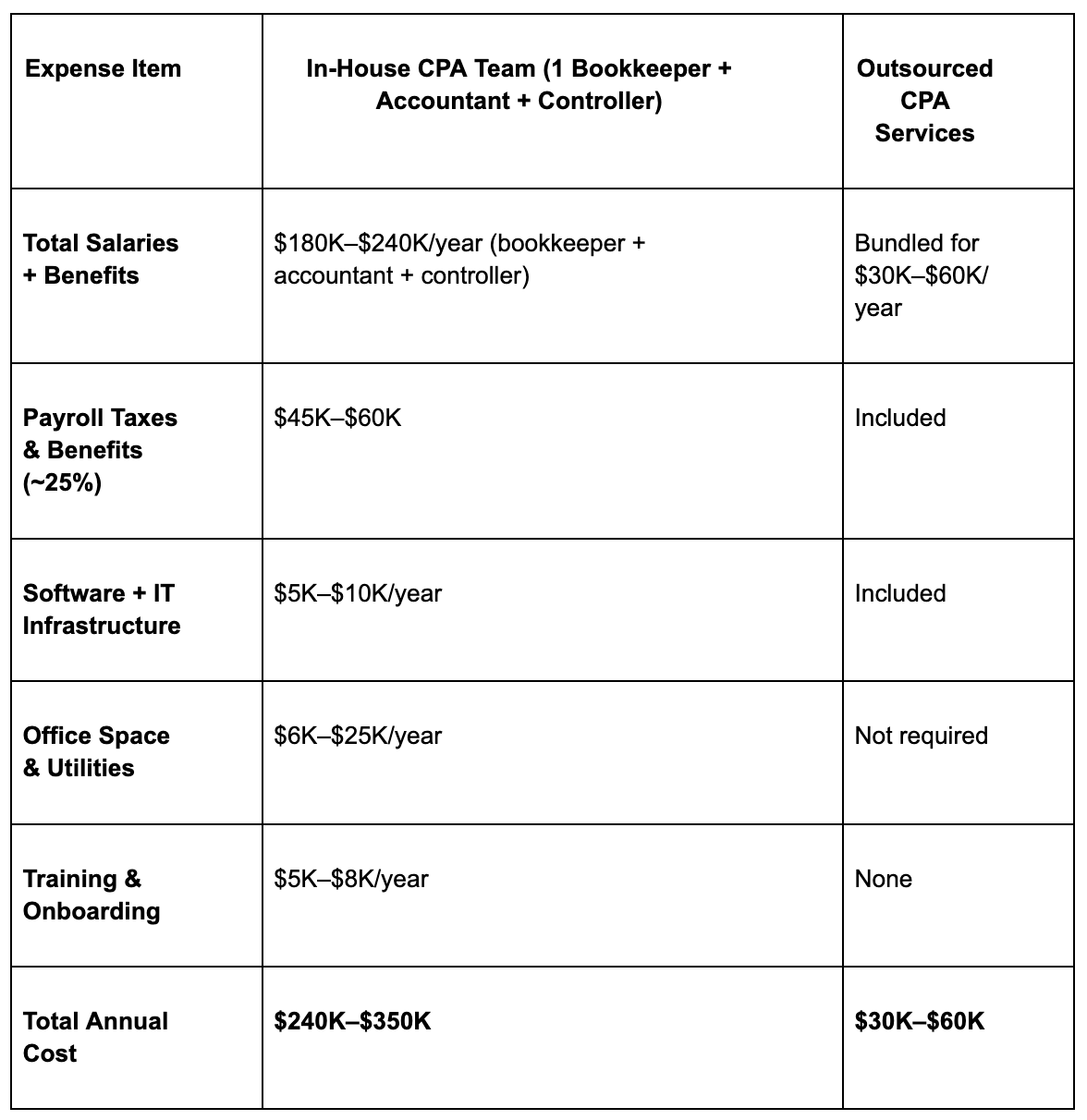Running a startup is hard enough without worrying about your books.
But here's the reality: if your financials are chaotic, your business decisions will be too. And when tax season or a fundraising round rolls in, you don't want to be scrambling.
That's exactly why more U.S. startups are turning to outsourced accounting for startups in 2025.
Outsourcing isn't just about cutting costs anymore. It's about:
At Madras Accountancy, we've worked with early-stage and startups and growing companies across industries, from SaaS to D2C, and we've seen one thing consistently: financial clarity can't wait until Series A. And it doesn't have to come with a full-time salary tag.
In this guide, we'll break down what the best outsource CPA services cover, when to bring one in, what to look for in a partner, and how to make it work for your stage.
If you've been doing taxes in spreadsheets or toggling between three different apps to close your books, this one's for you.
Startups move fast. But accounting? It's complex, messy, and unforgiving when ignored. That's where CPA services for startups come in, not just to "do the books," but to give startups financial clarity, compliance confidence, and investor-ready reporting from day one.
At Madras Accountancy, we've built our services specifically for early-stage and growing U.S. startups who don't need a full in-house accounting team, but still want accounting solutions that think like a partner.
Here's what you can (and should) outsource:
Clean books aren't a luxury. They're a necessity if you're fundraising, preparing for audits, or even just trying to understand your margins.
We offer bookkeeping services including:
Missed filings or misunderstood deductions can tank your runway. We handle comprehensive tax services:
Need help preparing investor updates? Or building a financial model before your Series A?
We plug in with advisory services:
Getting this wrong on day one = costly fixes later. We help you:
Onboarding employees, managing equity compensation, or paying freelancers overseas? We streamline:
You don't need a giant accounting department. You need the right mix of compliance, insight, and strategy, without drowning in overhead. We give you that layer of finance clarity so you can stay focused on building.
Running a startup isn't just product and growth. It's payroll. Tax filings. Board decks. Cash flow questions that keep you up at night. That's where outsourcing accounting services come in, not just to "do the numbers," but to help you use those numbers.
Here's what you actually gain when you do it right:
Every hour you spend inside spreadsheets is an hour you're not talking to customers, shipping features, or raising capital.
With outsourced accounting solutions:
Example: One of our early-stage clients saved ~12 hours/month after outsourcing bookkeeping and tax filings, time they reinvested into product.
Hiring an in-house accounting team in the U.S. can cost anywhere from $70K to $120K+ per year, not counting benefits or bonuses. Most startups simply don't need that, at least not yet.
What outsourced finance and accounting gives you instead:
Think of it like "fractional finance muscle", you pay for skill, not desk time.
Whether you're raising pre-seed or prepping a Series A, your financials will get scrutinized. Clean books, accepted accounting principles-compliant reports, and clear cash flow statements aren't optional, they're deal breakers.
Professional accounting partners help you:
Most startup founders leave money on the table because their accountant doesn't specialize in growth-stage businesses.
With the right outsourced accounting team:
Good outsourced accountants don't just keep you compliant. They make sure your tax strategy works like a founder's finance playbook.
As your startup grows, your financial complexity scales fast, multiple states, international contractors, deferred revenue models, stock options.
Professional services firms grow with you:
Madras Accountancy, for example, offers full-stack startup services, so startups don't have to switch partners every time they hit a new milestone.
For most startups, accounting isn't just a back-office function, it's survival. From managing burn to preparing for your next fundraise, getting your financials right early on can be the difference between clarity and chaos. But here's the problem: most early-stage teams can't afford a full-time CFO, tax expert, or financial controller.
That's where outsourcing accounting functions comes in.
When done right, outsource CPA services for startups offer the strategic brainpower of a finance team, without the cost or overhead. Below are the five core services smart startups typically outsource, and what to know before handing over the books.
This is your financial foundation, and if it's messy, nothing else will work.
Most early founders start with spreadsheets or software like QuickBooks or Wave. But as soon as you're dealing with recurring revenue, SaaS billing, investor capital, or payroll, DIY bookkeeping becomes a liability.
What startups outsource:
Why it matters: Without clean books, your burn rate is just a guess. And your next investor will spot sloppy data from a mile away.
At Madras, we often take over books that have been patched together by well-meaning founders or virtual assistants. Cleaning up months of miscategorized expenses? It's a common fix, but an expensive one. Early outsourcing avoids that cost later.
Startups don't just pay taxes, they also have opportunities to save on them. But only if you know what to claim and how to stay compliant.
What startups outsource:
What's often missed: Early-stage startups often overpay or under-claim. We've seen founders unaware of startup tax credits worth thousands, or worse, getting penalized for late filings because nobody was tracking state nexus rules.
Outsourcing your accounting helps ensure you're not leaving money on the table or attracting IRS attention you don't want.
You might think of payroll as "just paying people." But in the eyes of the IRS, it's a compliance minefield. Misclassify a contractor, miss a withholding deadline, or forget a state registration, and you're looking at fines, or worse, back pay lawsuits.
What startups outsource:
A real risk: Many founders unknowingly run afoul of state payroll laws (e.g., hiring a W-2 employee in California while incorporated in Delaware). Outsourcing payroll handles the legal and regulatory side of hiring, so you can focus on the people, not the paperwork.
What's your actual runway? When will you need to raise again? Are your unit economics improving? These aren't philosophical questions, they're spreadsheet ones. And they're only answerable if you have the right reports, built from clean data.
What startups outsource:
Pro tip: Investors won't just ask for "a model." They'll test your assumptions. An outsourced accounting firm for startups with startup experience can build reports that pass scrutiny, and help you steer, not just survive.
A growing number of startups are hiring fractional CFOs, part-time financial experts who offer high-level insight without full-time cost.
What startups outsource here:
At Madras Accountancy, we support startups from pre-seed to Series B with fractional CFO services built for fast-moving teams. You get access to senior finance leadership, without a $200K salary.
Simple rule: if it's distracting you from building or selling, outsource it. Start with the tasks that are breaking, then expand as you grow.
Not sure what's worth outsourcing right now? Madras Accountancy can walk you through what makes sense for your stage, your industry, and your team.
📩 Schedule a free call

Not every startup needs to outsource on Day 1. But wait too long, and you'll be cleaning up a financial mess when it matters most, like during due diligence or a funding round.
So how do you know the right time to bring in external accounting support?
Here's a clear, founder-focused framework that'll help you decide:
You should outsource basic accounting and bookkeeping services if:
💡 Tip: This is often the cheapest time to get help. A small retainer can keep your books clean and help you avoid accounting issues that are expensive to fix later.
Outsource finance leadership if:
📈 Our insight: Most of our fractional CFO clients start here. Founders are under pressure to extend runway, budget wisely, and justify each spend. Outsourced services bring that financial discipline without adding headcount.
Outsource full-stack CPA + strategic finance if:
🛠️ Common trigger: Founders realize they've outgrown DIY finance tools. It's not about not being smart, it's about not having time or clean data to lead effectively.
Think of outsourced CPA services as a lever, not a cost. When done right, they don't just keep you compliant, they give you financial clarity, investor readiness, and peace of mind.
At Madras Accountancy, we work with startups across every stage, from first invoice to Series B. Whether you need a lean bookkeeping setup or full-stack strategic finance, we plug in where it hurts the most.
📞 Ready to get proactive? Contact Us now.

When you're outsourcing your accounting operations, you're not just hiring a vendor. You're bringing in someone who could impact your runway, investor readiness, tax position, and peace of mind.
Here's a 5-part decision framework to help you get it right:
📌 Red flag: Too corporate or too junior? That's a mismatch.
📌 Look for: Modular service tiers with clear pricing.
📌 Test this in your first call: how do they explain your own financials back to you?
📌 Ask if they support API-driven books, real-time dashboards, or integrations with your stack.
📌 Founders sleep better when the books are clean and ready for due diligence.
Before signing a 12-month retainer, start with a 1–2 month trial for bookkeeping or tax cleanup. You'll quickly see if they deliver, or if you're chasing them by Week 3.
Madras Accountancy offers plug-and-play CPA services tailored for U.S. startups, from first invoice to financial model.
👉 Explore our services or schedule a call to talk through your needs.

This isn't fluff, you're making a decision that impacts your runway, growth potential, and even your next fundraise. Here's a clear, side-by-side view of what running finance in-house versus outsourcing costs.
Tech companies face unique financial challenges that make them especially good candidates for outsourcing accounting functions. Whether you're launching a startup in SaaS, fintech, or hardware, here's why a tech startup should consider dedicated accounting support:
For startups and small businesses, especially for startups in tech, growth can be explosive and unpredictable. Proper accounting infrastructure becomes critical when you're scaling from 10 to 100 employees rapidly.
Understanding the difference between small business accounting and enterprise solutions helps startups choose the right level of service:
Most growing startups need something in between, what we call "startup-grade" accounting:
Startups today are under pressure to move fast, stay lean, and make every dollar count. That's why outsourcing your CPA services isn't just a budget decision; it's a strategic one.
Instead of hiring a full in-house accounting team who you may not fully utilize, outsourcing gives you:
Sure, it's tempting to DIY your accounting or finance in the early days. But when you're raising funds, managing burn, and staying compliant, it pays to have pros on your side.
At Madras Accountancy, we've helped dozens of U.S.-based startups set up clean books, streamline tax filings, and prep confidently for VC due diligence, all without full-time costs. From accounting firms to independent accounting services practice partners, we've seen what works and what doesn't.
The reality is that compliance issues and accounting issues can derail even the most promising startups. Having proper accounting support in place isn't just about keeping the books clean, it's about positioning your company for sustainable growth.
📩 Schedule a discovery call if you want help figuring out what to outsource and when. No pressure, just answers.
The right CPA partner won't just save you money, they'll help you make smarter financial decisions, faster.
Question: What CPA services do startups typically need and when should they outsource them?
Answer: Startups typically need CPA services for tax planning and compliance, financial statement preparation, bookkeeping oversight, payroll processing, and business formation guidance. Outsource CPA services when monthly revenue exceeds $50,000, preparing for investor funding, facing complex tax situations, or lacking internal financial expertise. Essential services include quarterly tax filings, annual tax returns, financial audits for investors, and strategic tax planning. Startups should outsource early to establish proper financial foundations, ensure compliance, and access professional guidance for critical business decisions and growth planning.
Question: How much do outsourced CPA services cost for startups and what factors affect pricing?
Answer: Outsourced CPA services for startups typically cost $1,500-$5,000 monthly depending on company size, complexity, service scope, and provider location. Basic packages including tax compliance and bookkeeping review start around $1,500-$2,500 monthly, while comprehensive services with strategic advisory reach $3,000-$5,000 monthly. Pricing factors include transaction volume, number of entities, industry complexity, reporting requirements, and frequency of advisory services. Annual tax preparation costs $1,000-$5,000 additionally, while specialized services like audit support or fundraising assistance may incur project-based fees of $5,000-$15,000.
Question: What are the key benefits of outsourcing CPA services for startup companies?
Answer: Outsourcing CPA services provides startups with immediate access to experienced professionals, significant cost savings compared to full-time hires, and expertise in startup-specific tax and accounting issues. Benefits include proper financial foundation establishment, compliance assurance, strategic tax planning, and professional credibility with investors and lenders. Startups gain access to advanced accounting software, industry best practices, and objective financial guidance while focusing resources on core business development. Outsourced CPAs bring experience with startup challenges, fundraising requirements, and growth-stage financial management.
Question: How should startups choose the right CPA firm for outsourced services?
Answer: Startups should choose CPA firms with demonstrated startup experience, relevant industry knowledge, and comprehensive service offerings aligned with growth plans. Evaluate firms based on startup client references, understanding of venture capital requirements, experience with your industry or business model, and technology capabilities. Consider factors like response times, communication quality, fee transparency, and scalability options. Look for CPAs with experience in startup tax elections, stock option planning, multi-state compliance, and investor reporting requirements. Assess cultural fit and commitment to supporting startup growth and development.
Question: What startup-specific tax and accounting challenges can outsourced CPAs help address?
Answer: Outsourced CPAs help startups navigate complex tax elections like S Corporation status, stock option accounting, R&D tax credits, and multi-state tax compliance. They address challenges including equity compensation taxation, founder stock planning, investor reporting requirements, and compliance with securities regulations. Specialized areas include Section 83(b) elections, ISO and NSO planning, revenue recognition for subscription models, and international tax implications for global operations. CPAs also provide guidance on entity structure optimization, state tax nexus issues, and preparation for due diligence processes during fundraising activities.
Question: How do outsourced CPA services support startup fundraising and investor relations?
Answer: Outsourced CPA services support startup fundraising by preparing investor-ready financial statements, implementing proper accounting controls, and ensuring compliance with regulatory requirements. CPAs help with due diligence preparation, financial model validation, revenue recognition compliance, and audit readiness. They provide expertise in investor reporting requirements, cap table management, and valuation support for fundraising activities. Services include preparing detailed financial packages, implementing audit-ready accounting systems, and ensuring compliance with investor covenant requirements throughout the fundraising process.
Question: What technology and tools do outsourced CPA firms use to serve startup clients?
Answer: Outsourced CPA firms serving startups typically use cloud-based accounting platforms like QuickBooks Online, NetSuite, or Xero, integrated with specialized startup tools for equity management, expense tracking, and financial reporting. Common technology includes cap table management systems, automated bookkeeping tools, real-time reporting dashboards, and collaboration platforms for client communication. Advanced firms employ AI-powered transaction categorization, automated reconciliation tools, and business intelligence platforms for enhanced analysis and reporting. Integration capabilities connect accounting systems with startup operational tools for streamlined financial management.
Question: How can startups maintain effective communication and oversight with outsourced CPA providers?
Answer: Maintain effective communication with outsourced CPA providers through structured reporting schedules, regular video conferences, and shared access to financial systems and documents. Establish weekly or bi-weekly check-ins, monthly financial reviews, and quarterly strategic planning sessions. Use project management tools, shared calendars, and collaborative platforms for ongoing communication and document sharing. Set clear expectations for response times, reporting deliverables, and escalation procedures. Maintain access to accounting records and systems while allowing CPAs to perform necessary work efficiently and provide timely guidance on critical financial decisions.

A practical comparison of hiring a freelancer vs using a dedicated offshore accounting team, focusing on continuity, quality control, security, and scaling.

How CPA firms outsource payroll and 1099 work to reduce penalties and admin load, with a clean workflow for approvals, filings, and year-end reporting.

Practical do's and don'ts for CPA firms outsourcing accounting work, based on common failure points and what successful rollouts do differently.